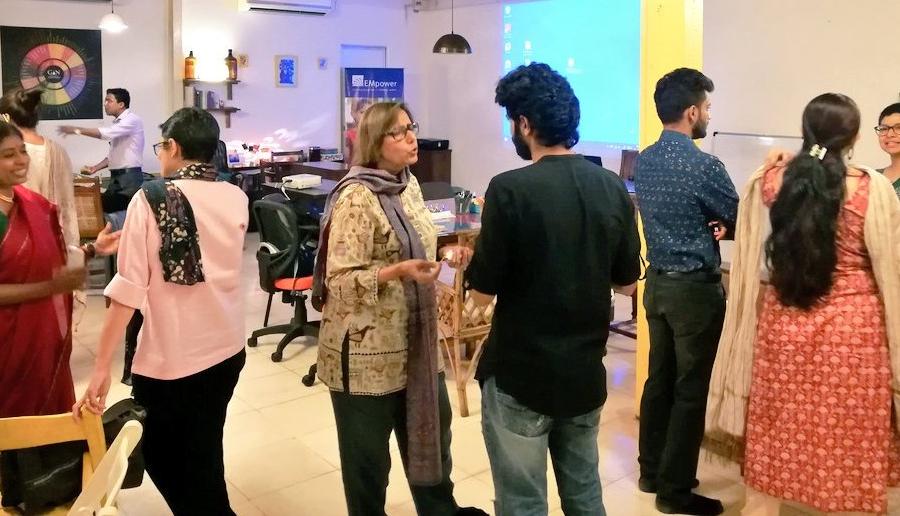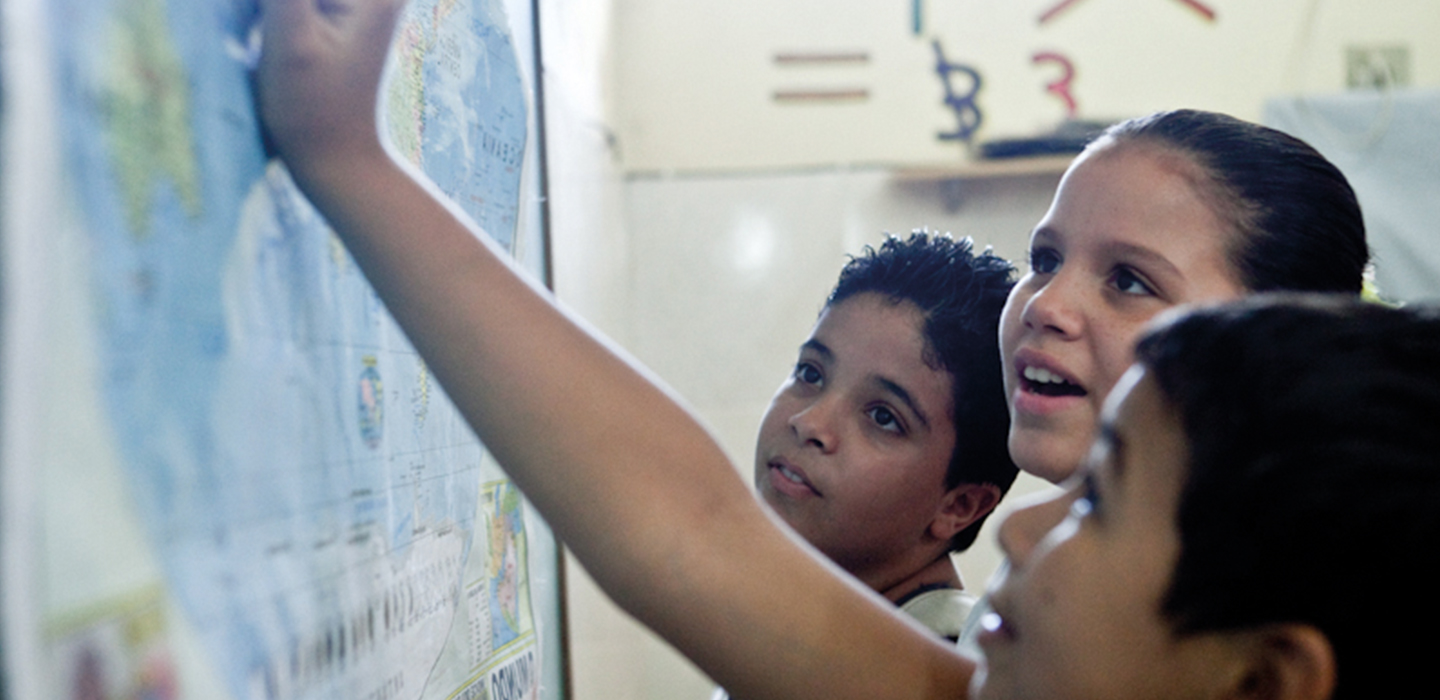Latest News
Building Bridges in Mumbai: A discussion on engaging men and boys in gender issues
Posted 16 August 2019 in EMpower News, Grantee Partner News | Share

Last week, on August 8, Mumbai played host to Building Bridges, EMpower’s Learning Exchange series that promotes knowledge-sharing and collaboration among our grantee partners in India. Antarang Foundation, Akshara Centre, Bright Future India, Committee of Resource Organisations for Literacy (CORO), Equal Community Foundation (ECF), Oscar Foundation, Partners for Urban Knowledge, Action and Research (PUKAR), The YP Foundation (TYPF), and Vacha Charitable Trust, participated in this day-long interaction. The theme for this Building Bridges Learning Exchange was “Engaging with men and boys.”
At this Learning Exchange, the objective was to discuss and understand diverse interventions that have been designed to engage men and boys in addressing gender issues. They did this by sharing insights from their current programs and research studies, delving deeper into the challenges of working in this space, acknowledging its complex nature, sharing their thoughts on unexplored territories, and brainstorming ideas to drive sustainable impact.
Exploring the connection between certain ideas of “masculinity” and gender-based violence
Anita Patil-Deshmukh, Executive Director, PUKAR spoke about how some elements of more traditional or stereotypical views of masculinity and experiences growing up can contribute to gender-based violence:
- Insecurities that develop in childhood such as exposure to domestic violence, family breakdown, a dysfunctional family unit, poverty, and abuse;
- Insecurities that develop in adolescence that can arise due to wrong information about sexuality, fear of unemployment, seeing other men as competitors, media portrayal of masculinity etc.
- Immense pressure on men to be “breadwinners” in their families and to follow traditional gender roles
- Fear of rejection by their peers that contributes to a normalization of violent (and dominating) tendencies toward women
Anita’s presentation highlighted how masculine identity, when associated with traditional or stereotypical gender roles, can hurt and limit not just girls, but boys as well. It prompted participants to reflect on positive community-led interventions that can address these issues.
Outcome-based and evidence-based approach to working with boys
Christina Furtado, Executive Director, ECF stated the objective of their work with boys: to enable adolescent boys to grow up without gender-bias. In her presentation, Christina explained ECF’s programs, tools and methods geared towards this objective. She shared results from recent cycles – one of the first changes observed in boys associated with
their program was a demonstrated initiative in taking responsibility for household chores.
Christina said that it was relatively easy to challenge, discuss and affect attitudes around roles/responsibilities, but it was difficult to talk about masculinities. The discussion after her presentation revolved around the following questions and ideas:
- Do these approaches work long-term?
- Can observed changes be attributed to specific interventions?
- How can we build a receptive ecosystem by working with the family and in the community?
- How does popular media influence attitudes?
Christina highlighted the importance of understanding where other organizations are in this journey of working with boys, what tools they are using and the desired outcomes.
Acceptability of gender equality among youth
Nandita Shah, Co-Director, Akshara Centre presented initial findings from a survey conducted to measure the acceptance of gender equality among urban youth and understand
their gender beliefs.
Using an intersectional approach to working with boys and men
Abhishek Sekharan, Coordinator, Masculinities and Prabhleen Tuteja, Director of Programmes from The YP Foundation introduced their study, “Mardon Waali Baatein” (Things about men) that emphasizes the need to unpack our understanding of masculinity using an intersectional lens that take into account historical, political and socio-cultural contexts. Some of the discussion points were:
- Men’s sexual practices and sexual health
- Men’s care networks, friendships, love and romance, and marriage
- Violence and masculinities
They also reviewed programmatic strategies for engaging with men. Some of the questions they raised were:
- Bolstering young men’s participation within programming - how can we tackle attrition, interest and challenge of creating spaces of reflection for young men?
- Diversifying platforms for engaging young men - what can we do on social media and what can be the challenges of devising social media strategies?
- Rethinking ways of engaging men on consent and violence – how can we integrate a lens of ‘dealing with rejection’ while talking to young men?
One of the key takeaways from their presentation was that organizations need to think about shifting their programmatic perspective from just engaging men towards a deeper examination of masculinities.
Boys as co-travellers on the girl empowerment journey
Priya Agrawal, Founder, Antarang Foundation moderated the closing session of the day which took the form of a panel discussion between participants. The theme was, “Exploring the role of boys as co-travellers on the girl empowerment journey.” She started with Antarang Foundation’s experience of making young people self-reliant and said that the journey was always long and winding. Priya highlighted the systemic roadblocks (security, sanitation, accessibility) that shape the way girls think about their professional aspirations.
She posed the following questions to the audience:
- Is there a role that boys and men can play to support the employability journey of the women in their lives?
- What happens when girls become older? How does their journey empower them? What roles do boys play in this process?
- Do you see any typical style of facilitation that works better with boys versus girls?
CORO, Oscar Foundation and the other participants all shared their diverse experiences of working with boys and men. They all stressed the need to reach out and involve the gatekeepers in communities, schools and other social settings.
Food for thought
The Building Bridges Learning Exchange: Engaging with men and boys in gender issues left everyone with pertinent questions about the future of working with men and boys. We were happy to see the willingness of our grantee partners to talk about their challenges and failures, and their openness to learn from each other. Conversations about collaboration began soon after the day ended. Through the Building Bridges series, EMpower hopes to continue to create a nurturing space for knowledge exchange on the issues our partners in India are tackling.
What we heard
View All NewsAbhishek shared some encouraging feedback with us – “It was refreshing to be in such an open space of dialogue and discussion that prompted many of us to (un)learn so much from each other’s inspiring work. There are immense learnings to be shared between all of us, and this is the step towards that goal. We look forward to more such dialogues in the future.”
Simran YL from Oscar Foundation said - “It gave us a chance to look at this topic from multiple lens and provided us the space to reflect on our work with boys. This discussion has encouraged us to start exploring partnerships with other organizations who can support us in further strengthening our work.”
More Latest News
- A Word with Prarthana Kumar
- Posted 16 April 2024
- Finding the Power
- Posted 16 April 2024
- A Word with Rachel Andrews
- Posted 20 March 2024
Upcoming Events
Connect with EMpower
Stay up-to-date on the latest EMpower news, highlights from our grantee partners, upcoming events, and more.
Make a Difference with EMpower
Our Board Directors and the Leadership Council underwrite all of our Management, General and Fundraising expenses, so 100% of your donation goes directly to empowering marginalised young people.

